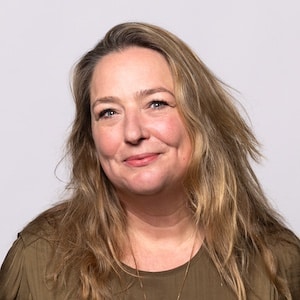Hayat Ihataren (PwC): ‘Diversiteit en inclusie moeten chefsache zijn’
Diversiteit en inclusie hebben inmiddels bij vrijwel elke organisatie een plek ingenomen op de agenda. Maar hoe verander je dit onderwerp van ‘we moeten hier iets mee’ naar een betekenisvol thema voor de hele organisatie? Hayat Ihataren, directeur inclusie & diversiteit, vertelt over de aanpak van PwC.
Nee, diversiteit en inclusie is bij PwC niet alleen iets van Hayat Ihataren en haar vierkoppige team. En nee, het is geen losstaand project binnen de organisatie. Ihataren en haar team werken er juist aan dat diversiteit en inclusie onderdeel worden van het PwC-dna. Alle leidinggevenden moeten ermee bezig zijn, alle medewerkers moeten snappen waarom het een belangrijk thema is en welke rol zij erin kunnen spelen.

Hayat Ihataren
Sinds de zomer van 2021 is Ihataren directeur inclusie en diversiteit bij de accountants- en adviesorganisatie. “Tot die tijd werkte ik direct voor onze klanten en hield ik me bezig met fusies en reorganisaties. Dat soort advieswerk gaat uiteindelijk ook over mensen. Over cultuur. Over hoe je mensen meekrijgt en hoe mensen met elkaar samenwerken. Daar wilde ik meer mee doen. Ook omdat ik vanuit mijn migratieachtergrond andere ervaringen meeneem. Vanuit deze rol zou ik dingen kunnen veranderen. En dus solliciteerde ik.”
De ervaringen waar ze op doelt gaan over het gebrek aan rolmodellen. “Als iemand met een multiculturele achtergrond heb ik mij lange tijd vooral aangepast aan de heersende cultuur. Veel mensen die niet tot de meerderheid behoren doen dat. Dat is jammer. Je bent dan niet authentiek, staat niet in je kracht en de organisatie profiteert dan dus ook niet van het andere perspectief dat jij te bieden hebt.”
Ruimte voor andere perspectieven
In een diverse en inclusieve organisatie is de ruimte voor dat perspectief er wel. In zo’n organisatie houdt de meerderheid rekening met de minderheid. En die minderheid voelt zich veilig genoeg om authentiek te zijn, om anders te zijn. Dat is belangrijk voor een kennisorganisatie als PwC, maar eigenlijk voor elke organisatie, zegt Ihataren. “Er zijn zoveel onderzoeken die bewijzen dat diverse organisaties innovatiever zijn. Door ruimte te bieden aan verschillen, kunnen we beter samenwerken en die samenwerking binnen onze teams beïnvloedt de kwaliteit van ons werk. Ook zien we dat voor de jongere generatie die nu bij ons komt werken diversiteit en inclusie een belangrijk thema is.”
Bij PwC krijgen alle medewerkers trainingen over dit onderwerp. Ze leren daar hun eigen bias, hun eigen vooroordelen te herkennen. Ook zijn de beoordelingsprocessen bij PwC anders ingericht. “We hebben ons daarvoor afgevraagd hoe je iemand niet alleen vanuit je eigen perspectief beoordeelt. Jouw ideeën over wat succes is of over wanneer iemand getalenteerd is, zijn vaak gebaseerd op hoe je zelf bent. Daarom doet er in een beoordelingsproces nu altijd een derde persoon mee, iemand die vanuit een neutraler perspectief ook kritische vragen stelt.”
Een van de meest bijzondere deelprojecten ontstond na de eerste Black Lives Matter-protesten in Nederland, in het voorjaar van 2020. “Wij hebben toen aan een aantal mensen gevraagd om in een brief aan de hele organisatie te schrijven over hun ervaringen met discriminatie en racisme. Dat heeft veel impact gehad: sommige collega’s deelden voor het eerst hun ervaringen, wat ook weer indruk maakte op naaste collega’s. Naar aanleiding daarvan hebben vrijwel alle teams een dialoogsessie over dit onderwerp georganiseerd en sommige teams doen dat nog steeds regelmatig.”
Bovenaan prioriteitenlijst
Diversiteit en inclusie is een strategische prioriteit van PwC. “Dat moet ook wel om iets voor elkaar te krijgen. Diversiteit en inclusie moeten chefsache zijn.” Met andere woorden: zó belangrijk, dat het bovenaan de prioriteitenlijst staat van de hoogste baas. Ihataren vervolgt: “Je kunt bottom-up wel van alles proberen, maar als de raad van bestuur het niet als prioriteit heeft, is het lastiger om iets in beweging te krijgen.” Het beleid rondom diversiteit en inclusiviteit krijgt bij PwC daardoor ook vorm in cijfers. Zo wil PwC dat in 2030 30 procent van de partners en 35 procent van de directors vrouw is. En dat 15 procent van de partners en directors een diverse culturele achtergrond heeft. Die langetermijndoelen worden vervolgens weer vertaald naar jaarlijkse doelen voor instroom, promotie en uitstroom. Vooral collega’s met een andere culturele achtergrond stromen nog relatief veel uit.
Bij PwC ligt de focus nu op diversiteit en inclusie rondom bijvoorbeeld cultuur, gender, geaardheid en bijvoorbeeld mensen met een arbeidsuitdaging. Zo zijn er voor deze groepen netwerken die in rechtstreeks contact staan met Ihataren en met de raad van bestuur. Daar kunnen zij aangeven waar hun achterban tegenaan loopt. Maar volgens Ihataren gaat diversiteit en inclusie ook over niet-zichtbare verschillen. Bijvoorbeeld over mensen met een totaal andere opleidingsachtergrond. “Of je nu een achtergrond als chirurg of bioloog hebt of voor belastingadviseur hebt gestudeerd, ik denk dat iedereen een ander interessant perspectief meebrengt.”
Geduld en continue dialoog
Ze heeft heel wat adviezen voor organisaties die actief met diversiteit en inclusie aan de slag willen gaan. De belangrijkste is: zorg dat het leiderschap in de organisatie zich ermee bemoeit. Daarnaast moet iedereen in een organisatie zich bewust worden van zijn eigen perspectief en hoe dat je gedrag en beoordelingsvermogen beïnvloedt. “Geduld speelt hierbij een belangrijke rol, helaas is dat niet mijn sterkste punt. Voor dit thema moet je continu in dialoog blijven met mensen in de hele organisatie. Met af en toe een keer een sessie organiseren ben je er nog niet.”
Ihataren gaat ook naar veel bijeenkomsten over diversiteit en inclusie. “Daar doe ik veel kennis op. Zo was ik laatst bij een feestelijke bijeenkomst van het UAF, een stichting voor vluchtelingen-studenten waarmee wij samenwerken. Elk jaar krijgt een aantal van die studenten een werkervaringsplaats bij ons en dat aantal wil ik graag uitbreiden. Niet alleen vanuit maatschappelijk belang, maar ook omdat wij als bedrijf iets hebben aan die nieuwe perspectieven.”
Eigen rol tijdens ramadan
Ondertussen blijft Ihataren ook haar eigen rol onder de loep nemen. Ze geeft een mooi voorbeeld. “Een paar maanden geleden was ik aan het vasten voor ramadan. Ik kreeg in die periode van een afdeling een uitnodiging voor een vergadering, om iets te komen vertellen over diversiteit en inclusie. Die bijeenkomst stond gepland aan het einde van de dag en dat zijn de zwaarste uren als je aan het vasten bent. Eerst wilde ik het laten gaan, maar ik dacht ook: ik kan niet tegen iedereen zeggen dat ze zich kwetsbaar moeten opstellen en dat dan vervolgens zelf niet doen.”
Ihataren vroeg of ze eerder op de dag mocht aanschuiven, legde uit waarom en kreeg daar een positieve reactie op. “Dat was al super. Toen ik vervolgens aansloot, stond er geen eten en drinken op tafel, bewust niet. Misschien een klein gebaar, maar dat zorgde bij mij voor een enorm gevoel van verbondenheid, van inclusie.”
Tekst: Mirjam Streefkerk
3 juli 2023
Meer weten over
Neem contact op
Blijf jij ook op de hoogte?
8x per jaar nieuws en events uit de regio: schrijf je in voor de Board Update nieuwsbrief
Deel dit artikel
Wil je op de hoogte blijven?
Volg ons dagelijks op LinkedIn en schrijf je in voor de Board Update nieuwsbrief.
Lees ook deze berichten
- Eind januari presenteerden D66, VVD en CDA het nieuwe coalitieakkoord, met de ...
- Zes van de tien bedrijven in de Amsterdamse regio maken zich zorgen ...
- De innovatieve kracht van onze regionale industrie zorgt samen met de unieke ...

